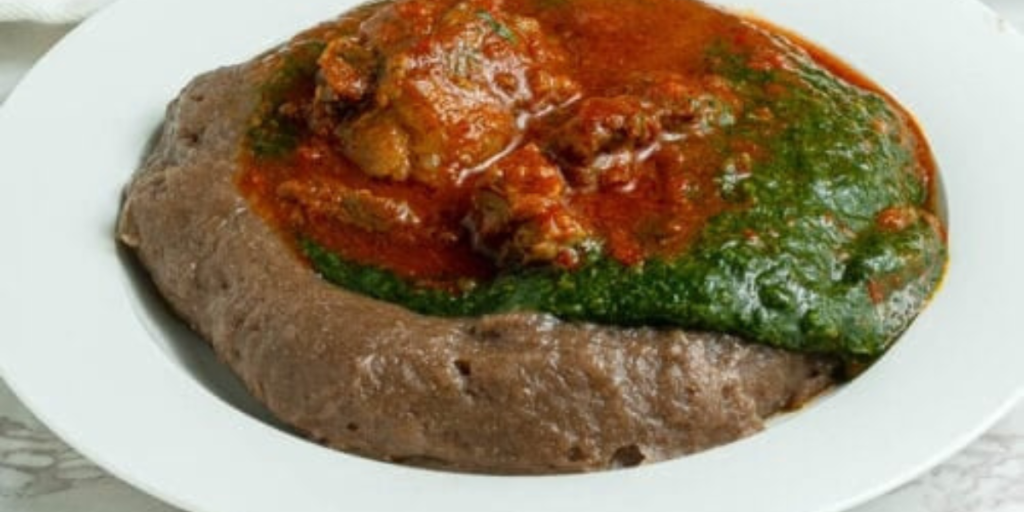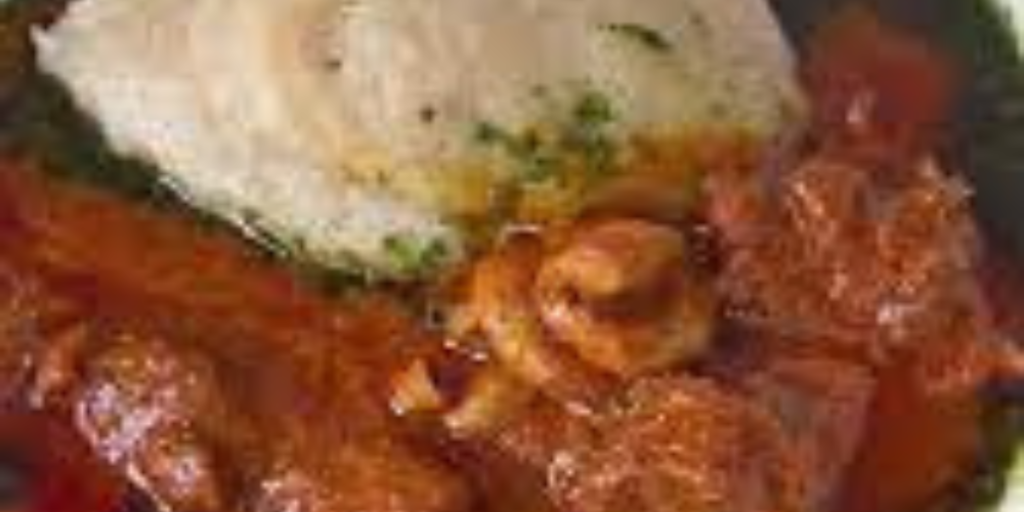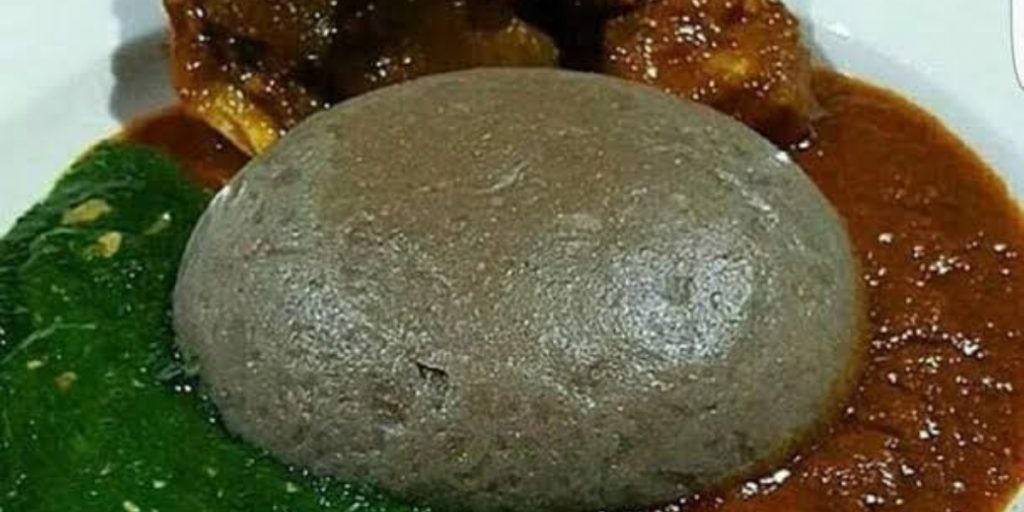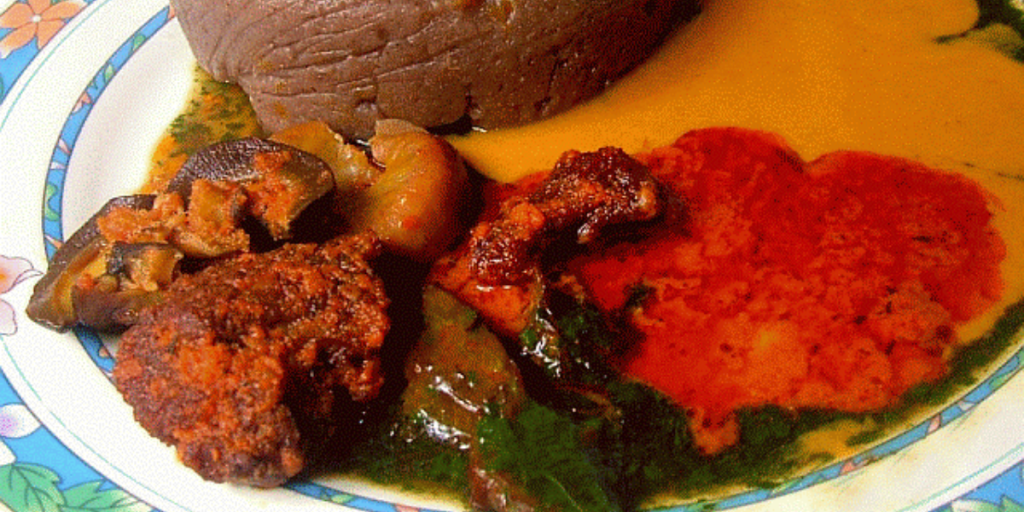Table of Contents
Amala Recipe: When it comes to Nigerian cuisine, Amala and Ewedu hold a special place as a beloved dish, especially among the Yoruba people. This classic meal is not only rich in tradition but also in flavor and nutrition. Whether you are new to the world of Nigerian dishes or a seasoned cook looking to perfect your skills, this guide will provide you with the ultimate Amala recipe to enjoy alongside delicious Ewedu soup.
What Is Amala?

Amala is a traditional Nigerian dish made primarily from yam flour (elubo), which is processed from dried yams. It has a smooth texture and is often dark brown or slightly ash in color. The dish pairs excellently with soups like Ewedu, Gbegiri (bean soup), or a rich stew made from tomatoes and peppers. Its unique taste and texture make it a standout staple in Nigerian homes.
Ingredients for Making Amala
To prepare the perfect Amala recipe, you’ll need the following ingredients:
- Yam flour (elubo) – 2 cups
- Water – 3 cups
- A wooden spatula or amala turner
Step-by-Step Amala Recipe
- Boil the Water
Start by pouring 3 cups of water into a pot and bring it to a rolling boil. The amount of water you use may vary depending on the desired consistency of your Amala. - Add the Yam Flour
Once the water is boiling, reduce the heat slightly and begin to sprinkle the yam flour into the water. Do this gradually while stirring continuously to avoid lumps forming. - Stir and Mix
Using a wooden spatula, stir the mixture vigorously. The goal is to achieve a smooth, lump-free consistency. If the mixture seems too thick, add a little warm water and continue stirring. - Cook Thoroughly
Allow the Amala to cook for about 3-5 minutes while stirring occasionally. This ensures the flour is fully cooked and the Amala has the desired texture. - Serve Hot
Scoop the Amala into a bowl and shape it using a spoon or your hands. Serve immediately with your prepared Ewedu soup.
How to Make Ewedu Soup
Ewedu soup is a simple, nutritious, and flavorful soup made from jute leaves. It complements Amala perfectly. Here’s a guide to preparing this popular Yoruba soup.
Ingredients for Ewedu Soup
- Fresh or frozen jute leaves (ewedu) – 2 cups
- Water – 1½ cups
- Potash (kaun) – a pinch (optional)
- Locust beans (iru) – 1 tablespoon
- Ground crayfish – 1 teaspoon
- Salt – to taste
- Seasoning cubes – 1 or to taste
Step-by-Step Ewedu Recipe
- Prepare the Leaves
If you’re using fresh jute leaves, wash them thoroughly to remove any sand or dirt. For convenience, frozen jute leaves work just as well. - Boil the Leaves
Bring 1½ cups of water to a boil in a pot and add the jute leaves. Let them simmer for about 5 minutes. - Blend or Whisk
Using a blender or a traditional Yoruba broomstick whisk (ijabe), mash the leaves until they form a smooth consistency. - Add Seasonings
Add potash (if using), locust beans, ground crayfish, and seasoning cubes. Stir well and allow the mixture to cook for another 3 minutes. - Adjust the Taste
Taste the soup and adjust the seasoning with salt if needed. Your Ewedu is ready to serve. - Tuwo Shinkafa: What Is Tuwo? Best Swallow Of 2025
Tips for Perfecting Your Amala Recipe

- Use Quality Yam Flour
The quality of your yam flour significantly affects the outcome of your Amala. Choose a well-processed, finely milled product for the best results. - Avoid Lumps
Sprinkle the yam flour into boiling water slowly and stir vigorously to avoid lumps. - Maintain the Right Consistency
Adjust the water and yam flour ratio based on whether you prefer a softer or firmer texture. - Serve Hot
Amala tastes best when served fresh and hot. Avoid reheating as this can alter the texture.
Pairing Amala and Ewedu with Protein
No Yoruba meal is complete without an addition of tasty proteins. Common pairings include:
- Beef or goat meat stew
- Assorted meats (such as shaki, pomo, and kidney)
- Fish stew
- Chicken stew
Adding a rich protein component to your Amala recipe elevates the meal and makes it even more satisfying.
Nutritional Benefits of Amala and Ewedu
The combination of Amala and Ewedu is as healthy as it is delicious. Here’s why:
- High in Fiber
Amala, made from yam flour, is rich in dietary fiber, aiding digestion and preventing constipation. - Rich in Vitamins
Ewedu is packed with vitamins A and C, which are essential for maintaining healthy skin and boosting immunity. - Low-Calorie Option
Compared to other staples, Amala is relatively low in calories, making it suitable for weight management. - Protein Boost
Adding locust beans and crayfish to Ewedu soup increases its protein content, essential for muscle repair and growth. - Health Benefits of Eating Tuwo Shinkafa and Tuwo Masara
Frequently Asked Questions About Amala Recipe

Q: Can I prepare Amala without lumps as a beginner?
Yes, the key is to sprinkle the yam flour gradually into boiling water while stirring continuously. Using a wooden spatula helps achieve a smooth texture.
Q: Can I use a whisk instead of an ijabe for Ewedu?
Absolutely! A blender or whisk works perfectly for achieving the smooth consistency typical of Ewedu soup.
Q: Is Amala gluten-free?
Yes, yam flour is naturally gluten-free, making Amala a great option for individuals with gluten intolerance.
Q: Can I freeze leftover Amala?
While it’s best to consume Amala fresh, you can store leftovers in the refrigerator for a day. Reheat by steaming it to restore some of its original texture.
Q: How can I make my Amala softer or firmer?
For softer Amala, use more water during preparation. For firmer Amala, reduce the water quantity slightly.
The Cultural Significance of Amala and Ewedu
In Yoruba culture, Amala and Ewedu are more than just a meal—they represent tradition, hospitality, and a sense of community. It is often served during festive occasions, weddings, and family gatherings. Mastering the Amala recipe is a skill passed down through generations, reflecting the rich culinary heritage of the Yoruba people.
Adding a Twist to the Classic Amala Recipe
While the traditional Amala recipe remains a timeless favorite, you can explore variations to suit your taste preferences or dietary requirements. Below are some exciting ways to add a twist to your Amala and Ewedu meal:
1. Add Sweet Potato Flour to Yam Flour
For a slightly sweeter and unique flavor, mix yam flour with sweet potato flour in a 2:1 ratio. This combination provides a delightful twist while retaining the smooth, stretchy texture of Amala.
2. Incorporate Spices into Your Ewedu Soup
To enhance the flavor of Ewedu, try adding a pinch of nutmeg or a small amount of ground chili pepper. These spices will give your soup a more aromatic and slightly spicy kick.
3. Top with Sesame Seeds or Groundnuts
Sprinkle toasted sesame seeds or finely ground peanuts over your Ewedu soup for a nutty flavor and additional crunch. This is an innovative way to boost the protein and healthy fat content of the meal.
4. Serve with Alternative Soups
While Ewedu is the classic pairing, you can also enjoy Amala with soups like Egusi (melon seed soup), Okra soup, or a rich vegetable soup. These variations allow you to explore different taste profiles while sticking to the basic Amala recipe.
Perfect Drinks to Pair with Amala and Ewedu

No meal is complete without a refreshing beverage. To complement the richness of Amala and Ewedu, here are some traditional Nigerian drinks you can enjoy:
- Zobo Drink
This hibiscus-based drink is slightly tangy, refreshing, and rich in antioxidants. Its cool and vibrant flavor balances the warmth of the meal. - Palm Wine
For those who enjoy traditional alcoholic beverages, palm wine offers a mildly sweet and fizzy pairing with the savory flavors of Amala. - Chapman
A popular Nigerian mocktail, Chapman is a fruity, fizzy drink that adds a celebratory touch to your meal. - Kunu
Made from millet or sorghum, Kunu is a lightly spiced drink with a creamy texture that complements the smoothness of Amala.
How to Store and Reheat Amala
While fresh Amala is unbeatable, there are times when leftovers need to be stored. Here’s how to store and reheat Amala while retaining its quality:
- Storage
- Wrap leftover Amala tightly in cling film to prevent it from drying out.
- Place it in an airtight container and refrigerate for up to 24 hours. Avoid storing it longer, as the texture and flavor might degrade.
- Reheating
- Steam the Amala rather than microwaving it to restore its smooth and stretchy consistency.
- Place the wrapped Amala in a steamer or place it over boiling water in a pot, covered with a lid, for about 5 minutes.
- Freezing Amala
If you must freeze Amala, ensure it is tightly wrapped to prevent freezer burn. Thaw it completely and steam it before serving.
Amala Recipe: A Dish for All Occasions
One of the remarkable aspects of Amala and Ewedu is their versatility. This meal is not only a household favorite but also a staple in celebratory events, including:
- Weddings
Guests often look forward to the hot, steaming bowls of Amala served with Ewedu, Gbegiri, and assorted meats. - Traditional Festivals
During Yoruba festivals like the Osun-Osogbo festival, Amala takes center stage as a symbol of cultural pride. - Family Reunions
Amala provides comfort and nostalgia for families gathering to share stories and bond over food. - Birthday Parties
It’s not uncommon to see Amala and Ewedu as the highlight dish in buffet-style meals during birthdays.
Common Mistakes to Avoid When Preparing Amala
Even with a straightforward Amala recipe, there are common pitfalls that can result in less-than-perfect results. Here’s how to avoid them:
- Adding Too Much Yam Flour at Once
This often causes lumps. Always sprinkle the flour gradually and stir as you go. - Using Cold Water
Amala must be made with boiling water to achieve the desired texture. - Overcooking the Mixture
Overcooking can make the Amala dry or too sticky. Cook for only 3-5 minutes once the flour is added. - Improper Storage
Exposing Amala to air without proper wrapping will dry it out quickly, making it unappealing when reheated.
Why Amala and Ewedu Are a National Treasure

Beyond being a meal, Amala and Ewedu symbolize Nigeria’s cultural heritage. They are celebrated not just for their taste but also for the communal experience of preparing and sharing the dish. The process of making Amala recipe, especially when done in a traditional setting, often involves stories, laughter, and a sense of togetherness.
From its origins in the western part of Nigeria to its widespread popularity across the country, this dish is a testament to the richness of Nigerian culinary tradition. With a focus on fresh, locally sourced ingredients, Amala and Ewedu highlight the creativity and resourcefulness of Nigerian cooking.
Tuwo Shinkafa: Best 5 Soups That Go Perfectly with Tuwo
Why You Should Try the Amala Recipe Today
The Amala recipe is more than just a meal; it’s a doorway to exploring Nigerian culture and cuisine. Its simplicity, versatility, and rich flavors make it a must-try for food lovers worldwide. Whether you’re new to Nigerian food or looking to recreate a childhood favorite, mastering Amala and Ewedu is an experience that will leave your taste buds delighted and your soul satisfied.
Take the time to gather your ingredients, follow the steps carefully, and most importantly, enjoy the process. Once you take that first bite of smooth, stretchy Amala dipped in savory Ewedu, you’ll understand why this dish holds such a special place in Nigerian hearts and homes. Happy cooking!
Nutritional Benefits of Amala and Ewedu(Deeper View)
Amala and Ewedu are not just flavorful but also packed with nutrients that promote overall health. Let’s dive into the nutritional advantages of this traditional Nigerian meal.
1. Rich in Complex Carbohydrates
Amala, made from yam flour, is a great source of complex carbohydrates. These carbs provide sustained energy, making it an excellent choice for a busy day.
2. Loaded with Fiber
The fiber content in Amala supports digestive health, helping to prevent constipation and regulate blood sugar levels. This makes it a good meal option for those managing diabetes.
3. Ewedu is a Superfood
Ewedu leaves are rich in:
- Vitamin A: Essential for eye health and a strong immune system.
- Calcium: Promotes bone and teeth strength.
- Iron: Prevents anemia and boosts energy levels.
- Antioxidants: Protect the body from oxidative stress and aging.
4. Low in Fat
Amala and Ewedu are naturally low in fat, making them a heart-healthy option, especially when paired with lean protein like fish or chicken.
5. A Good Source of Protein
When served with protein-rich soups like Ewedu combined with Gbegiri (bean soup) or meats, this dish provides all the essential amino acids necessary for body repair and muscle growth.
How to Serve Amala Like a Pro
To truly enjoy the Amala recipe, presentation plays a key role. Here’s how you can serve it in style:
1. Using Traditional Serving Bowls
- Serve the Amala in a rounded heap on a traditional wooden platter or a calabash for an authentic Yoruba dining experience.
- Pour the Ewedu soup into a separate bowl, allowing diners to dip as desired.
2. Layer with Gbegiri and Ewedu
For a richer and visually appealing meal, layer the Ewedu on top of the Gbegiri soup, then garnish with a drizzle of red palm oil and a sprinkle of ground crayfish.
3. Garnish Creatively
- Add slices of boiled eggs or smoked fish on top of the Ewedu for an elegant touch.
- Fresh chopped onions and green peppers can also enhance the look and taste.
4. Pair with Fresh Vegetables
Serve with a side of steamed vegetables like spinach or kale to add a burst of color and extra nutrients to the plate.
Common Myths About Amala and Ewedu
Despite its popularity, a few myths surround the Amala recipe. Let’s debunk them!
1. “Amala is Unhealthy”
This myth likely stems from its carbohydrate content. In reality, Amala is made from yam, which is a natural, nutrient-dense food. When consumed in moderation, it supports energy and good health.
2. “Only Experts Can Make Amala”
Preparing Amala might seem intimidating at first, but with the right technique, anyone can master it. The key is using boiling water, stirring vigorously, and ensuring lump-free consistency.
3. “Ewedu Soup is Just Slimy Water”
While Ewedu has a slimy texture, it’s far from “just water.” Properly prepared Ewedu soup is seasoned with locust beans, crayfish, and stock cubes, resulting in a flavorful and nutrient-rich dish.
4. “Amala Can’t Be Reheated”
As long as you store it correctly and reheat it by steaming, leftover Amala can be just as enjoyable as fresh Amala.
Hosting an Amala and Ewedu Party
Planning to host a party or gathering? Making Amala and Ewedu the star of the menu can leave your guests impressed. Here’s how to make it a hit:
1. Prepare in Large Quantities
Use a large pot and a heavy-duty wooden spatula for stirring when making Amala for a crowd. Recruit helpers to make the process faster and more enjoyable.
2. Create a Soup Bar
In addition to Ewedu, offer a variety of soups like Gbegiri, Okra, and Egusi. Let guests mix and match their preferred combinations.
3. Include Assorted Proteins
Serve a wide range of proteins such as goat meat, cow leg, pomo (cow skin), turkey, and fish to cater to different tastes.
4. Set Up a Traditional Display
Decorate the dining area with Yoruba-themed elements like calabashes, woven mats, and cultural artifacts. This enhances the overall dining experience.
Healthier Alternatives for Amala Recipe
For those looking to make the Amala recipe even healthier, consider these modifications:
1. Opt for Unrefined Yam Flour
Unrefined yam flour retains more nutrients than its processed counterpart. Look for brands labeled “whole grain” or “natural.”
2. Use Less Palm Oil in Ewedu
While palm oil adds richness, using it sparingly can lower the fat content without compromising flavor.
3. Incorporate Millet or Sorghum Flour
Mixing millet or sorghum flour with yam flour adds more fiber and micronutrients, making the dish even more nourishing.
4. Add Vegetables to the Amala
Blend finely chopped spinach or pumpkin leaves into the dough during preparation for added color, flavor, and nutrients.
Celebrating the Legacy of Amala and Ewedu
Amala and Ewedu transcend being just a meal—they represent the soul of Yoruba cuisine and culture. Each bite carries the essence of tradition, hospitality, and the pride of a people who celebrate their roots through food. Whether enjoyed casually at home or at a grand event, the Amala recipe brings people together, fostering connections and creating cherished memories.
As you experiment with this recipe, remember that cooking is an art. Feel free to make adjustments, try new ingredients, and create your unique version of Amala and Ewedu. Your journey with this dish will not only satisfy your hunger but also deepen your appreciation for Nigerian culinary heritage.





















